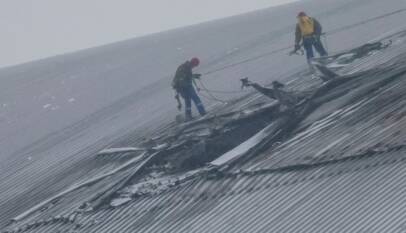Gulf States Urge U.S. to Block Israeli Strike on Iran’s Oil
The Gulf states are currently lobbying the United States to intervene and prevent Israel from launching attacks on Iran’s oil infrastructure. Their concern stems from the fear that Tehran could retaliate against their own oil facilities if Israel strikes Iran, potentially dragging the entire region into a broader conflict. Saudi Arabia, the United Arab Emirates (UAE), and Qatar are particularly apprehensive about being caught in the crossfire. As part of their efforts to avoid escalation, they have refused to allow Israel to use their airspace for any potential strike on Iran. According to a report by Reuters, the Gulf states have communicated this stance to Washington, emphasizing their desire to remain neutral in any potential conflict.
This tension follows Israel’s promise to retaliate against Iran after a missile attack, with Tehran warning that any Israeli action would result in severe consequences. The Gulf states’ actions come amid a broader diplomatic effort by Iran to dissuade its neighbors from allowing Israel to target its oil facilities. In a series of meetings held this week, Iran specifically warned Saudi Arabia that it could not guarantee the safety of the kingdom’s oil installations if they assist Israel in any capacity. Iranian officials conveyed that Tehran’s proxies in neighboring countries, such as Iraq and Yemen, could target Gulf states in retaliation.
One prominent Saudi analyst, Ali Shihabi, stated that Iran has explicitly warned Gulf states that allowing Israeli forces to use their airspace would be considered an act of war. He added that Saudi Arabia, in particular, would not permit any country to use its airspace for such purposes. Gulf sources also confirmed that Tehran had sent strong messages to Riyadh, highlighting the potential involvement of Iran’s allies if there was any regional support for Israel.
The situation has become a focal point for diplomatic efforts in the region. On Wednesday, Saudi Crown Prince Mohammed bin Salman met with Iranian Foreign Minister Abbas Araqchi as part of Iran’s tour of the Gulf states aimed at rallying support. Gulf sources close to the matter revealed that these discussions, along with ongoing communication between Saudi and U.S. defense officials, are part of a broader strategy to prevent an escalation of the crisis. Additionally, Gulf leaders have been in touch with U.S. officials, urging Washington to ensure that any Israeli retaliation remains measured.
Despite their concerns, Israel is considering its options. According to senior Israeli officials, the country is carefully calibrating its response, and while the possibility of striking Iran’s oil facilities is on the table, no final decision has been made. Israeli Defense Minister Yoav Gallant remarked that any Israeli strike would be “lethal, precise, and surprising,” though it remains unclear if this would involve targeting Iran’s oil production.
The Gulf states’ refusal to allow Israel access to their airspace for a potential attack is seen as a crucial aspect of their strategy to remain neutral. However, analysts note that Israel has other options, such as using Jordanian or Iraqi airspace or relying on its mid-air refueling capabilities to carry out the strike. Israel could potentially fly through the Red Sea into the Indian Ocean before returning to the Gulf, avoiding the airspace of Gulf countries altogether.
Oil remains a central concern in these developments. The Organization of Petroleum Exporting Countries (OPEC), which Saudi Arabia leads, holds sufficient spare capacity to compensate for any disruption in Iranian oil production if Israeli strikes were to damage Iran’s oil facilities. However, much of this spare capacity is concentrated in the Gulf region, meaning that any attack on Saudi or UAE oil infrastructure could cause a significant disruption in the global oil supply.
The vulnerability of Gulf oil installations has been a longstanding concern. In 2019, an attack on Saudi Arabia’s Aramco oil facilities, allegedly carried out by Iranian proxies, temporarily halted over 5% of the world’s oil supply. Although Iran denied involvement, the incident heightened fears about the region’s oil security. Despite the recent rapprochement between Saudi Arabia and Iran, mistrust persists, and the possibility of renewed conflict over oil remains a significant worry for Gulf leaders.
The potential for a wider conflict and its impact on global oil markets has also caught the attention of major powers. China, as Iran’s largest oil customer, would likely feel the effects of any disruption in Iranian oil production. The United States, too, would face significant economic consequences if oil prices were to surge. As a result, Gulf officials believe that Washington will likely act to prevent the conflict from expanding, particularly with the U.S. presidential election looming. A spike in oil prices could hurt the U.S. economy and potentially damage Vice President Kamala Harris’s chances in the election, in which she is running against Donald Trump.
Despite having advanced missile and defense systems, Gulf states remain cautious about the possibility of Iranian retaliation. Their primary strategy, therefore, remains diplomatic—communicating to Tehran that they do not pose a threat and signaling their intention to stay out of the conflict. Bernard Haykel, a professor of Near East Studies at Princeton University, noted that Gulf states, particularly Saudi Arabia, are vulnerable to Iranian strikes due to the proximity of their oil installations to Iran.
In conclusion, the Gulf states are walking a tightrope as they seek to avoid being dragged into a potential conflict between Israel and Iran. By refusing to allow Israel access to their airspace and pursuing diplomatic solutions, they aim to protect their vital oil infrastructure and avoid a wider regional war. However, the situation remains tense, and the possibility of escalation looms large, with global economic implications at stake if the conflict were to disrupt the region’s oil production. The coming days will be crucial in determining whether diplomacy can avert a broader conflict or if the region is heading toward a dangerous confrontation.
Civil Aviation Ministry Caps Airfares After IndiGo Disruptions Trigger Price Surge
Dec 2025 : The Ministry of Civil Aviation on Saturday said it has invoked its regulatory p…




















